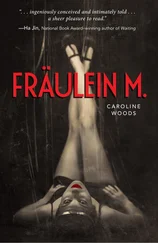“Because there’s a man in an office cranking a printing press, trying to make enough to repay the Frogs. You must quit this nasty habit of chewing the ends of your plaits, Bernadette. You look like a wild orphan.”
If anyone else had said this, Berni would have balked. The word “orphan” was taboo among the girls. They were daughters of St. Luisa. They were Lulus.
Konstanz gave Berni a jab, and Berni looked down to see a yellow cardboard cone in her lap. Both of them watched the sisters eat as Konstanz passed it to Berni under the table.
The cone was a Schultüte , the gift parents gave their children on the first day of school. As Berni’s greedy fingers dug inside, her eyes drifted over the long tables and benches, settling on Hannelore Haas, an eight-year-old who’d arrived the day before. Her eyes were swollen from crying. As had been happening to families more and more frequently, Hannelore’s parents had been unable to support all their children, and so they left their eldest here. Giving her the cone was almost cruel, Berni thought; it suggested this place was just like any other school, though as soon as Hannelore saw it she must have recognized it for what it was.
Of course, the other girls had immediately seized Hannelore’s parents’ parting gift. Nobody was allowed to think she was special just because her parents were alive. Emboldened by Sister Maria’s absence from breakfast, they’d been passing it from table to table. By the time it reached Berni, the toys and school supplies and most of the wrapped candies were gone. She dug out a chocolate-covered nut, then glanced once more toward the sisters before popping it into her mouth. When she looked up, Hannelore’s glazed eyes were fixed on her.
“Don’t,” Grete murmured, but Berni bit into the chocolate, and her eyelids fell shut. The flavor, a bit bitter, stung the sides of her mouth and set her molars buzzing. The nut crunched into a sweet, oily paste. She could see the flavors, somehow, painted on her closed lids: magenta and yellow and aquamarine. When she opened her eyes to the whitewashed brick walls, the bare bulbs dangling from the ceiling, the gray of the girls’ uniforms and the black cluster of nuns, she almost couldn’t believe this dull vision was the real world.
“Try one.” She pressed the cone toward Grete. “They aren’t paying attention,” she added with a nod toward the sisters’ table.
Grete shook her head, her blue eyes wide with fear.
“You have to. The chocolate, it’s—it’s a carnival. It’s May Day and Christmas together.”
Again Grete refused, and Berni pinched her lightly on the arm. If they were caught with Hannelore’s Schultüte , they both knew Berni would be in trouble, not Grete. The sisters scarcely noticed Grete. Sometimes it seemed even to Berni that her sister had been crafted from less substantial stuff than she was, that God’s brush had a little less paint on it when he made Grete, his clay mixed with a little more water. She was pale and petite, with weak hearing; there was nothing weak about Berni. The sisters said she must have had a bit of gypsy in her, with her dark coloring, her big feet and hands, her restless energy. All the proof Berni and Grete had that they were related were the shallow clefts in their chins, and their name. They were called Metzger, not Kirchhof or Ostertag, names the sisters gave to foundlings. Later, Berni promised, when they left St. Luisa’s, they would find other Metzgers. It would mean something.
“Fine,” Berni whispered when Grete refused again. “More for me.” The girls on the other side of Grete groaned.
“ Ruhe bitte! ” The refectory door swung wide, slamming the opposite wall.
Chairs shifted and spines straightened. Berni pressed the cone against her leg, willing it to disappear.
The reverend mother stood in the doorway with a wheelbarrow. A woman thick of neck and skull, Sister Maria taught six years of Latin to every child who came through St. Luisa’s. As she passed, Berni strained to peek inside her wheelbarrow and saw that it was stuffed with crisp new money. Sister Odi leapt from her table to waddle behind Sister Maria, picking up bills that had fluttered to the floor. When Sister Maria reached the back door, she stood and put her hands to the base of her long spine, straightening it in a series of cracks. Berni waited, holding her breath, for the firewood man to knock on the door. It did not take long.
“Come in,” Sister Maria said, standing impassive beside her wheelbarrow.
Berni had expected him to gasp at the sight of all that money, but he merely looked exhausted. Sister Maria had turned the wheelbarrow around so he could grasp the handles.
“This’ll buy you one log.” He cringed a little, inspecting her face, awaiting censure.
“He said they can afford only one log!” Berni said into Grete’s left ear. Grete nodded and swatted her away.
Sister Maria rose another few centimeters, her forehead level with the firewood man’s. According to rumor, she had been everything from a boatswain’s daughter to a lady wrestler in a traveling circus before taking the vows of the Order. The man shrank in her presence; the hand that held out the one dry log shook.
“We agreed on the price just last night,” she said, her voice firm.
“The price has already changed.” He scratched the back of his neck. “Most likely it has changed as we stand here. Nothing I can do about it.”
“These are children, mein Herr . They will freeze to death without a fire.”
“You know how things are, Sister. Madness.”
Berni could feel every girl in the room watching Sister Maria, waiting to see what would happen, eyes blinking in unison like those of a giant spider. “Keep your log,” Sister Maria said after a long pause. “God bless you in this difficult time.”
The man handed Sister Maria a few slivers of kindling without a word. After he had gone, Sister Maria stared at the kindling and the pile of cash. “Sister Odi,” she barked. “Take all of this and put it in the fire.”
“All of . . .” Sister Odi said, sputtering a bit. “You don’t mean . . .”
“It won’t do us any good as money,” Sister Maria said, flicking her hand over the wheelbarrow. “We might as well use it to light the kindling.”
Sister Odi reached into the pile of money and looked at it as though she wasn’t quite sure what it was. Gingerly she tucked a handful into the fireplace. Then she lit a match. Berni hovered a few inches above her bench to watch the bills curl and crumble, licked by the flames. A few banknotes skirted across the floor, lifted by a draft.
“What a shame,” Berni whispered. “They have so much money they can burn it. They might as well have given some to me, to us.”
The side of her vision went black. Berni turned to see Sister Maria looming, draping the girl across the table in the deep folds of her double sleeves. The odors of incense and lemon soap wafted from the fabric. “You should not be in awe of money, girls,” said Sister Maria, her gray-green eyes fixed on Berni’s.
Behind her the phrase Iudicate egeno, et pupillo, the guiding verse of the Order of St. Luisa, was painted on the wall in Bavarian script. The sisters translated it as “Defend the poor and fatherless.” Berni knew iudicate could mean “defend,” but it could also mean “judge.” Sister Maria insisted the two were interchangeable.
“Remember,” said Sister Maria, “where your treasure is . . .” She held out her hand.
“Where your treasure is,” Berni said, completing the scripture, “there will your heart be also.” She handed the Schultüte to Sister Maria. Across the room, Hannelore yelped.
Читать дальше












